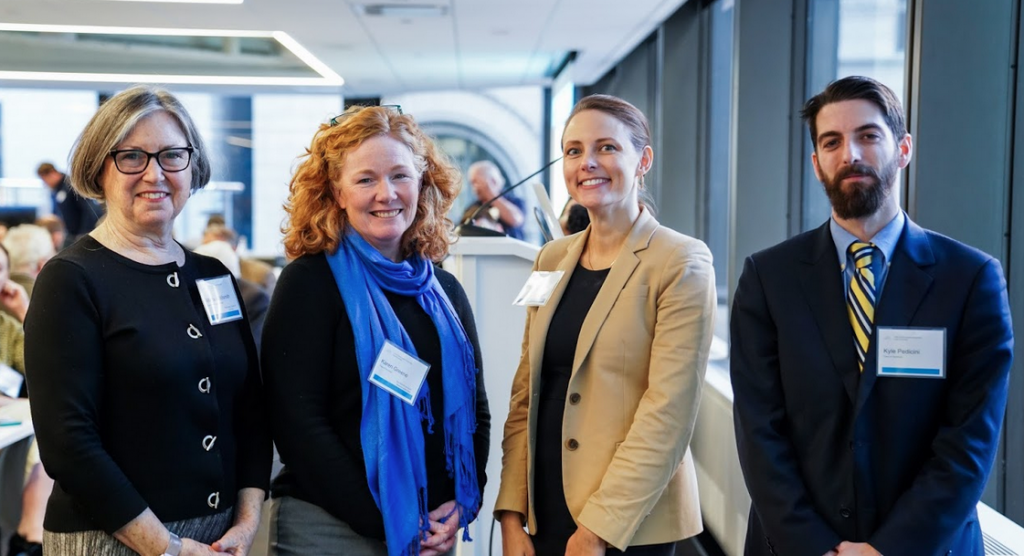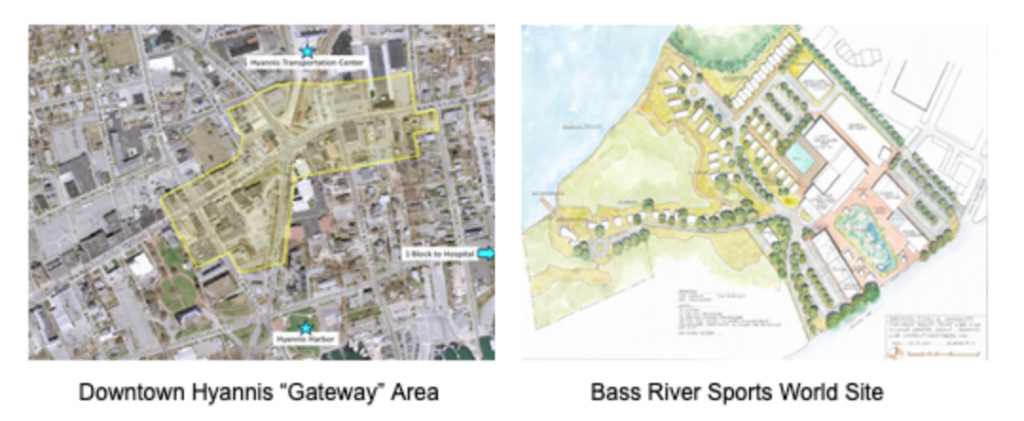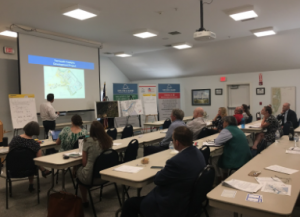
News
By Smart Growth America, February 4, 2020
The Cape Cod beach communities of Barnstable and Yarmouth sought guidance from LOCUS and Smart Growth America’s Form-Based Codes Institute in utilizing their respective Opportunity Zones to create a better sense of place within their communities, with a shared goal of attracting more year-round residency.
This post is part of a series summarizing the experience and outcomes of the inaugural class of Smart Growth America and LOCUS’s Massachusetts Opportunity Zones Academy. Read about Barnstable and Yarmouth, and be sure to check out the posts for Salem, Fitchburg, and Greenfield-Montague.

Left to right: Cohort lead Marta Goldsmith, Director of the Form-Based Codes Institute at Smart Growth America; Karen Greene, Director of Community Development, Town of Yarmouth; Elizabeth Jenkins, Director of Planning & Development, Town of Barnstable; and Kyle Pedicini, Economic Development Coordinator, Town of Yarmouth at the Massachusetts Opportunity Zone Convening in November 2019.
In May 2019, LOCUS selected the neighboring towns of Barnstable and Yarmouth on Cape Cod as joint participants in Massachusetts’ first-ever Opportunity Zones Academy. The two communities were chosen because of their demonstrated willingness to adopt land use and other regulatory changes that encourage equitable, smart growth development.
Throughout September and October of 2019, Barnstable and Yarmouth worked with staff from LOCUS, LOCUS Massachusetts, and the Form-Based Codes Institute on understanding Opportunity Zones and other smart growth strategies to improve their urban form, encourage development and renovation of mixed-use, multifamily housing, and catalyze year-round residency and economic activity.
First, each town selected a local catalytic development site to help focus their technical assistance attention and outcomes. Barnstable identified an area in the center of Hyannis’ historic downtown, called the Gateway Area, and Yarmouth chose a locally-owned recreational center, Bass River Sports World, located off of Route 28.

Barnstable and Yarmouth’s technical assistance program kicked off in September 2019, when over 50 local stakeholders participated in two half-day visioning workshops facilitated by Marta Goldsmith, Director of the Form-Based Codes Institute. During these visioning sessions, participants created a high-level conceptual visions for the Gateway Area and Bass River Sports World sites and their surrounding neighborhoods.

In Yarmouth, the visioning session revealed a pent-up demand for proper wastewater infrastructure. Participants discussed several possible solutions to the town’s lack of wastewater infrastructure, including a District Improvement Financing (DIF) plan. Such a plan would allow a public or public-private entity to issue bonds to pay for new wastewater infrastructure at the Bass River Sports World site. The bonds would eventually be paid off with the increase in surrounding property values. Goldsmith recommended using an Opportunity Fund, a qualified investment vehicle specific to Opportunity Zone investment, to make participation in the DIF more attractive to investors.
To encourage more walkable, affordable, and mixed-use development the two communities created questions for the Form-Based Code Institute about possible code changes. The questions included:
- How can we make our catalytic development areas more walkable, mixed-use, and intensively developed by enhancing the urban form and making development more “place-based?”
- How can we encourage redevelopment and repurposing of existing properties?
- Are our ordinances transparent, easy to use, and friendly to responsible real estate developers and investors?
After reviewing Barnstable and Yarmouth’s zoning regulations, the Form-Based Codes Institute presented its code recommendations and responses to local stakeholders in October 2019.
- Simplify current regulations by combining commercial districts under one set of land-use and development codes and streamlining guidelines in existing historic districts.
- Consider reducing the number of documents that apply to regulations in distinct districts.
- Create great streetscapes for people and cyclists.
- Allow parking to follow form, so that the built environment is not dominated by surface parking; consider adopting an integrated transportation demand management strategy.
- Hire a branding consultant to prepare a prospectus and marketing/advertising plan for potential developers and investors.
Next steps for Barnstable include developing a downtown action plan and strategy with a focus on zoning, capital improvements, and marketing and branding. Yarmouth plans to simplify their zoning bylaws in order to encourage development, as well as continue to educate their residents on the need for wastewater infrastructure improvements and options for financing the project. Given all of the feedback, insight, and expert advice received during the Massachusetts Opportunity Zones Academy, the towns of Barnstable and Yarmouth should feel more confident in their future placemaking endeavors. Hopefully their actions will inspire other towns on the Cape to think about the value of a strong sense of place and how they can improve it.
The Massachusetts Opportunity Zones Academy was a six month technical assistance program led by Smart Growth America and LOCUS to educate cities and towns in Massachusetts with designated Opportunity Zones on how to best take advantage of the new tax incentive to stimulate equitable development, responsible real estate investment, and community engagement. In 2019, as part of the inaugural Massachusetts Opportunity Zones Academy, LOCUS worked with six communities: Barnstable-Yarmouth, Fitchburg, Greenfield-Montague, and Salem.
Related News

© 2025 Smart Growth America. All rights reserved
Site By3Lane Marketing








